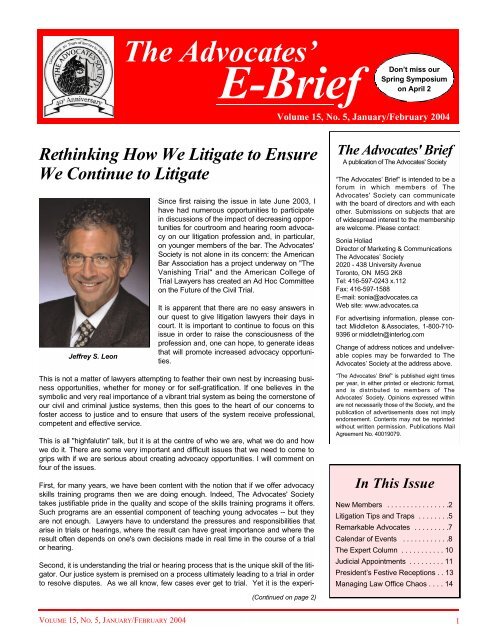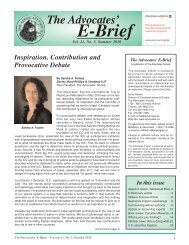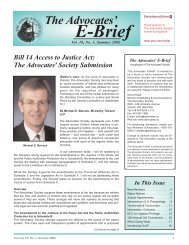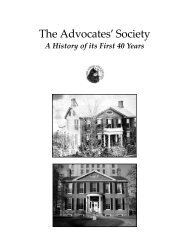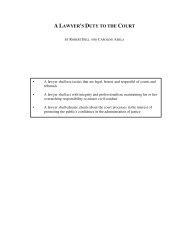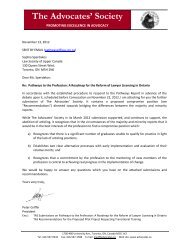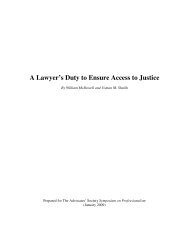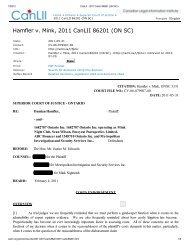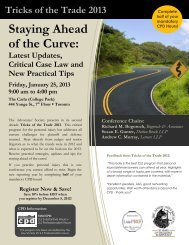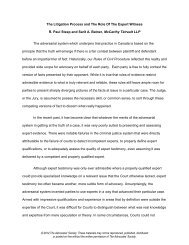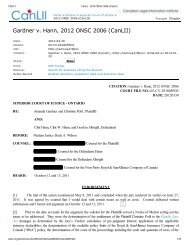E-BRIEF - Jan-Feb 2004 - The Advocates' Society
E-BRIEF - Jan-Feb 2004 - The Advocates' Society
E-BRIEF - Jan-Feb 2004 - The Advocates' Society
You also want an ePaper? Increase the reach of your titles
YUMPU automatically turns print PDFs into web optimized ePapers that Google loves.
<strong>The</strong> Advocates’<br />
E-Brief<br />
Don’t miss our<br />
Spring Symposium<br />
on April 2<br />
Volume 15, No. 5, <strong>Jan</strong>uary/<strong>Feb</strong>ruary <strong>2004</strong><br />
Rethinking How We Litigate to Ensure<br />
We Continue to Litigate<br />
Jeffrey S. Leon<br />
Since first raising the issue in late June 2003, I<br />
have had numerous opportunities to participate<br />
in discussions of the impact of decreasing opportunities<br />
for courtroom and hearing room advocacy<br />
on our litigation profession and, in particular,<br />
on younger members of the bar. <strong>The</strong> <strong>Advocates'</strong><br />
<strong>Society</strong> is not alone in its concern: the American<br />
Bar Association has a project underway on "<strong>The</strong><br />
Vanishing Trial" and the American College of<br />
Trial Lawyers has created an Ad Hoc Committee<br />
on the Future of the Civil Trial.<br />
It is apparent that there are no easy answers in<br />
our quest to give litigation lawyers their days in<br />
court. It is important to continue to focus on this<br />
issue in order to raise the consciousness of the<br />
profession and, one can hope, to generate ideas<br />
that will promote increased advocacy opportunities.<br />
This is not a matter of lawyers attempting to feather their own nest by increasing business<br />
opportunities, whether for money or for self-gratification. If one believes in the<br />
symbolic and very real importance of a vibrant trial system as being the cornerstone of<br />
our civil and criminal justice systems, then this goes to the heart of our concerns to<br />
foster access to justice and to ensure that users of the system receive professional,<br />
competent and effective service.<br />
This is all "highfalutin" talk, but it is at the centre of who we are, what we do and how<br />
we do it. <strong>The</strong>re are some very important and difficult issues that we need to come to<br />
grips with if we are serious about creating advocacy opportunities. I will comment on<br />
four of the issues.<br />
First, for many years, we have been content with the notion that if we offer advocacy<br />
skills training programs then we are doing enough. Indeed, <strong>The</strong> <strong>Advocates'</strong> <strong>Society</strong><br />
takes justifiable pride in the quality and scope of the skills training programs it offers.<br />
Such programs are an essential component of teaching young advocates -- but they<br />
are not enough. Lawyers have to understand the pressures and responsibilities that<br />
arise in trials or hearings, where the result can have great importance and where the<br />
result often depends on one's own decisions made in real time in the course of a trial<br />
or hearing.<br />
Second, it is understanding the trial or hearing process that is the unique skill of the litigator.<br />
Our justice system is premised on a process ultimately leading to a trial in order<br />
to resolve disputes. As we all know, few cases ever get to trial. Yet it is the experi-<br />
<strong>The</strong> <strong>Advocates'</strong> Brief<br />
A publication of <strong>The</strong> <strong>Advocates'</strong> <strong>Society</strong><br />
“<strong>The</strong> Advocates’ Brief” is intended to be a<br />
forum in which members of <strong>The</strong><br />
<strong>Advocates'</strong> <strong>Society</strong> can communicate<br />
with the board of directors and with each<br />
other. Submissions on subjects that are<br />
of widespread interest to the membership<br />
are welcome. Please contact:<br />
Sonia Holiad<br />
Director of Marketing & Communications<br />
<strong>The</strong> Advocates’ <strong>Society</strong><br />
2020 - 438 University Avenue<br />
Toronto, ON M5G 2K8<br />
Tel: 416-597-0243 x.112<br />
Fax: 416-597-1588<br />
E-mail: sonia@advocates.ca<br />
Web site: www.advocates.ca<br />
For advertising information, please contact<br />
Middleton &Associates, 1-800-710-<br />
9396 or middletn@interlog.com<br />
Change of address notices and undeliverable<br />
copies may be forwarded to <strong>The</strong><br />
Advocates’ <strong>Society</strong> at the address above.<br />
“<strong>The</strong> Advocates’ Brief” is published eight times<br />
per year, in either printed or electronic format,<br />
and is distributed to members of <strong>The</strong><br />
Advocates’ <strong>Society</strong>. Opinions expressed within<br />
are not necessarily those of the <strong>Society</strong>, and the<br />
publication of advertisements does not imply<br />
endorsement. Contents may not be reprinted<br />
without written permission. Publications Mail<br />
Agreement No. 40019079.<br />
In This Issue<br />
New Members . . . . . . . . . . . . . . . .2<br />
Litigation Tips and Traps . . . . . . . .5<br />
Remarkable Advocates . . . . . . . . .7<br />
Calendar of Events . . . . . . . . . . . .8<br />
<strong>The</strong> Expert Column . . . . . . . . . . . 10<br />
Judicial Appointments . . . . . . . . . 11<br />
President’s Festive Receptions . . 13<br />
Managing Law Office Chaos . . . . 14<br />
(Continued on page 2)<br />
VOLUME 15, NO. 5, JANUARY/FEBRUARY <strong>2004</strong><br />
1
Welcome to Our<br />
New Members<br />
Government<br />
Brian Saunders,<br />
Department of Justice (Canada)<br />
Intermediate<br />
Sarah Armstrong,<br />
Fasken Martineau DuMoulin LLP<br />
Lisa F. Barazzutti,<br />
Carlesso Barazzutti<br />
Carmen Belcredi,<br />
Ledrew Laishley Reed LLP<br />
Dawn Bourque,<br />
Cassels Brock & Blackwell LLP<br />
James Meric Brown,<br />
Nelligan O'Brien Payne LLP<br />
Antonella Ceddia,<br />
McCarthy Tétrault LLP<br />
Cindy Marie Chaves Ebben,<br />
Giffen Lee LLP<br />
Jessica Fiore, Bennett Jones LLP<br />
Sean Hanley,<br />
Attorney General of Ontario<br />
Martha L. Harrison,<br />
Rochon Genova LLP<br />
Evangelia Litsa Kriaris,<br />
Bennett Jones LLP<br />
Bianca La Neve, Bennett Jones LLP<br />
Damienne Lebrun-Reid,<br />
Bennett Jones LLP<br />
Lisa F. Metselaar, Lerners LLP<br />
Marni D. Munsterman,<br />
Beach May & Konyer Associates<br />
Mark Power, Heenan Blaikie LLP<br />
Kellie R. Seaman, Groia & Company<br />
Stuart Svonkin, Torys LLP<br />
Paul Taylor, Bennett Jones LLP<br />
Melisse L. Willems,<br />
Fasken Martineau DuMoulin LLP<br />
Keri Wilson, Shillington & Associates<br />
P. James Zibarras,<br />
Borden Ladner Gervais LLP<br />
Judicial<br />
<strong>The</strong> Hon. Justice William P. Bassel,<br />
Ontario Court of Justice<br />
<strong>The</strong> Hon. Justice Jean-Gilles Lebel,<br />
Ontario Court of Justice<br />
<strong>The</strong> Hon. Justice<br />
Kathryn L. McKerlie,<br />
Ontario Court of Justice<br />
<strong>The</strong> Hon. Justice David A. Stone,<br />
Ontario Court of Justice<br />
(Continued from page 1)<br />
ence derived in the courtroom or hearing<br />
room that makes a litigator effective<br />
in giving advice on litigation strategy to<br />
achieve a particular result. It is the<br />
same experience that allows a litigator<br />
to be effective in the mediation or settlement<br />
contexts, through the ability not<br />
only to evaluate what a case is worth<br />
but also to allow for a real alternative --<br />
trial -- if mediation cannot produce an<br />
appropriate settlement.<br />
Third, we must acknowledge that, from<br />
an ethical perspective, the issue is one<br />
that goes to the essence of competence.<br />
We hold ourselves out as trial<br />
lawyers. If we are not prepared to go to<br />
court, because we don't know how, we<br />
are letting the "fear of trialing" distort our<br />
judgment. We are not providing competent<br />
service to clients. We need to<br />
acknowledge this fear factor and deal<br />
with it.<br />
Fourth, a failure to appreciate and<br />
understand the trial or hearing process<br />
can have a negative rebound effect, particularly<br />
in the civil justice context.<br />
Nowhere is this more apparent than in<br />
the way we approach and conduct documentary<br />
and oral discovery. Not having<br />
had to prove a document at trial or not<br />
having had to use a discovery transcript<br />
at trial affects counsel's ability to know<br />
what to do in the discovery process.<br />
Regular Out of Toronto<br />
Roger H. Chown,<br />
Carroll Heyd Chown<br />
Richard D. Howell, Aylesworth<br />
Thompson Phelan O'Brien LLP<br />
Leigh Ann Sheather,<br />
Gowling Lafleur Henderson LLP<br />
Regular<br />
M. Christine Fotopoulos,<br />
Borden Ladner Gervais LLP<br />
Mara Greene, Schreck & Greene<br />
Douglas Hunt, Q.C.,<br />
Hunt Partners LLP<br />
Ramani Nadarajah, Canadian<br />
Environmental Law Association<br />
Valerie D. Wise, Lerners LLP<br />
David Young,<br />
Benson Percival Brown<br />
<strong>The</strong> problem is not only, as I previously<br />
suggested, that discovery becomes the<br />
ultimate adversarial experience; it goes<br />
beyond that to not understanding how to<br />
analyze a case before discovery, not<br />
understanding the concept of relevance<br />
and not understanding the importance of<br />
precise, thoughtful questioning.<br />
As will be discussed below, one result of<br />
this phenomenon is massive production<br />
of documents and prolonged, if not endless,<br />
questioning on discovery. Indeed,<br />
it is this process that increases the cost<br />
of litigation, which we then use as one of<br />
the primary reasons why clients should<br />
settle rather than go to trial.<br />
What then can we do about this situation?<br />
Can we make changes that will<br />
create opportunities for advocacy? Here<br />
are four possibilities:<br />
(1) We have to commit ourselves in a<br />
significant way to giving young lawyers<br />
the opportunity to supplement their skills<br />
training with real experience in courtrooms<br />
and hearing rooms. We have to<br />
invest in this complete training process<br />
in order to derive future benefits from<br />
having effective litigators available to<br />
give advice and resolve disputes<br />
whether inside or outside of a courtroom<br />
or hearing room. <strong>The</strong>se opportunities<br />
exist. For example:<br />
(a) allow juniors to attend and participate<br />
in trials at reduced rates or at no<br />
cost to the client;<br />
(b) promote opportunities for pro bono<br />
work by allowing younger lawyers to represent<br />
the under-represented -- those<br />
who need and want representation but<br />
are forced to proceed to trial without representation<br />
for economic reasons,<br />
including: civil cases, minor criminal<br />
cases (especially those that do not<br />
require the specialized skills of the criminal<br />
lawyer in Charter and other issues),<br />
and some types of family cases, particularly<br />
in areas such as child protection;<br />
(c) offer the services of younger lawyers<br />
on a reduced or no-rate basis in order to<br />
allow clients to use the trial process to<br />
resolve minor civil disputes on an economic<br />
basis through small claims or simplified<br />
rules trials.<br />
(2) We have to create mechanisms to<br />
(Continued on page 3)<br />
2<br />
VOLUME 15, NO. 5, JANUARY/FEBRUARY <strong>2004</strong>
(Continued from page 2)<br />
facilitate the access of lawyers to these<br />
opportunities. Increased use of the<br />
Lawyer Referral Service is one possibility.<br />
An expanded pro bono organization<br />
that would put lawyers in touch with<br />
those who need representation is another.<br />
<strong>The</strong> <strong>Advocates'</strong> <strong>Society</strong> should take<br />
a lead role in this regard.<br />
(3) On a more general and long-term<br />
basis, we have to re-think the way in<br />
which we provide litigation services to<br />
our clients. Let me be the first to admit:<br />
"My name is Jeff and I ask too many<br />
questions on discovery." We need to<br />
put an end to our approach to litigation<br />
that makes it uneconomical for a client<br />
to litigate. As litigators we have never<br />
come to grips with the technological<br />
changes and the information explosion<br />
that have forever altered the way we<br />
practise law. Leaving aside the professional<br />
considerations, if we view the<br />
matter just from a business perspective,<br />
we have priced ourselves out of the<br />
market by making the "trial alternative"<br />
too expensive. <strong>The</strong> cost of getting to and<br />
conducting a trial becomes the reason to<br />
settle. This distorts the settlement<br />
process because if settlement is not<br />
"voluntary" and if the merits of a case<br />
have little to do with outcome, then the<br />
results of settlement will not be accurate<br />
in the sense of approximating the results<br />
of a trial based on the merits of a case.<br />
<strong>The</strong> time has come to change our litigation<br />
culture -- to teach advocates how to<br />
litigate on a cost-effective basis. How<br />
many of us have really stopped to think<br />
about the cost to a client of a particular<br />
line of questioning on discovery relating<br />
to some tangential point? When is the<br />
last time we actually found that smoking<br />
gun? We need to identify the ways we<br />
can attract clients back to using the trial<br />
alternative by giving value proportionate<br />
to cost. I would submit that this should<br />
become the key issue on both a professional<br />
and a business perspective. We<br />
can and should develop best practices<br />
and new ways of doing things that will<br />
bring our clients back to the courtroom.<br />
<strong>The</strong> recent report of the Task Force on<br />
the Discovery Process in Ontario is a<br />
first step that provides several ideas in<br />
this regard.<br />
(4) We should not overlook what I have<br />
described as the fear factor. We don't<br />
really talk about the frustration and<br />
Attorney General Michael J. Bryant was the special guest at a recent meeting of the<br />
<strong>Society</strong>’s Board of Directors. Left to right: Benjamin Zarnett of Goodman LLP; Linda<br />
Rothstein of Paliare Roland Rosenberg Rothstein LLP; Michael E. Barrack of McCarthy<br />
Tétrault LLP; Jeffrey S. Leon of Fasken Martineau DuMoulin LLP; <strong>The</strong> Honourable Michael<br />
J. Bryant, Attorney General and Minister Responsible for Native Affairs; Sandra A. Forbes<br />
of Davies Ward Phillips & Vineberg LLP, and Jack Braithwaite of Gatien & Braithwaite.<br />
demoralization experienced by lawyers<br />
who want to be trial counsel but can't be<br />
because of lack of opportunity. We<br />
should talk more about this. We should<br />
do something about this. Indeed one<br />
reason suggested for the reluctance of<br />
firms to invest in providing litigation<br />
opportunities for young lawyers is the<br />
increased mobility in the profession: we<br />
train them and then they leave. Once<br />
again the process is circular. If as a profession<br />
we can provide increased job<br />
satisfaction perhaps lawyers would not<br />
be so quick to give up and leave to look<br />
for better opportunities elsewhere.<br />
All of these comments must be viewed in<br />
the context of our common law system.<br />
We need trials not only to resolve disputes<br />
but also to develop the law in a<br />
modern context - - to develop common<br />
law principles that reflect current social<br />
economic and business reality.<br />
Mediation and private arbitration are<br />
important components of a dispute resolution<br />
system, but they do not serve this<br />
additional, very important function.<br />
I hope that the work of <strong>The</strong> <strong>Advocates'</strong><br />
<strong>Society</strong> Task Force on Advocacy will be<br />
a first step. Our <strong>Society</strong> has been at the<br />
forefront of promoting our traditions of<br />
advocacy. We should re-focus our<br />
efforts to remain at the forefront of the<br />
future of advocacy.<br />
References:<br />
<strong>Jan</strong>et Alexander Cooper, "Do the Merits<br />
Matter? A Study of Settlements in<br />
Securities Class Actions," (1991) 43<br />
Stanford Law Review 49.<br />
ABA Section on Litigation, "Report of the<br />
Task Force on Training the Trial Lawyer,"<br />
(June 2003)<br />
Keven C. McMunigal, "<strong>The</strong> Costs of<br />
Settlement: <strong>The</strong> Impact of Scarcity of<br />
Adjudication on Litigating Lawyers,” (1990)<br />
37 UCLA Law Review 833<br />
Marc Galanter, "<strong>The</strong> Vanishing Trial: An<br />
Examination of Trials and Related Matters<br />
in Federal and State Courts," Symposium<br />
on the Vanishing Trial, ABA Section on<br />
Litigation, San Francisco, California<br />
(December 2003)<br />
NICE<br />
MOVE<br />
Please notify Carolyn Cook,<br />
Membership Coordinator,<br />
if you mailing address or firm<br />
name will be changing.<br />
416-597-0243 x.102<br />
carolyn@advocates.ca<br />
VOLUME 15, NO. 5, JANUARY/FEBRUARY <strong>2004</strong><br />
3
OUR TEAM MAY<br />
NOT SEEM VERY<br />
INTIMIDATING. UNTIL THEY TESTIFY.<br />
Complex business disputes require a sophisticated analysis. We have experienced investigative and forensic<br />
accountants, computer forensic specialists, civil litigation consultants and insurance claims specialists ready to<br />
objectively analyze the facts underlying a dispute and testify to their findings in court. Our worldwide network<br />
and resources enable us to overcome geographic boundaries. For more information, please contact:<br />
Toronto<br />
Daniel Edwards 416 941 8330<br />
David Griffiths 416 941 8229<br />
Steve Henderson 416 941 8328<br />
Bob Martin 416 941 8306<br />
John Seigel 416 815 5087<br />
Bruce Webster 416 815 5250<br />
Ottawa<br />
Ron Jackson 613 755 4343<br />
Hamilton<br />
Jim Forbes 905 972 4105<br />
London<br />
Bruce Webster 519 640 8009<br />
PricewaterhouseCoopers is proud to sponsor Advocates’ <strong>Society</strong> events and programs.<br />
www.pwcglobal.com/ca<br />
© 2003 PricewaterhouseCoopers LLP. “PricewaterhouseCoopers” refers to PricewaterhouseCoopers LLP, an Ontario limited liability partnership, or, as the context requires,<br />
the network of member firms of PricewaterhouseCoopers International Limited, each of which is a separate and independent legal entity.<br />
4 VOLUME 15, NO. 5, JANUARY/FEBRUARY <strong>2004</strong>
Litigation Tips & Traps - “Southren” Style<br />
By <strong>Jan</strong>e Southren<br />
McDonald & Hayden LLP<br />
One of the challenges that may face a<br />
newly-called litigator in a smaller firm is<br />
that the firm may not offer the breadth of<br />
knowledge and diversity of experience<br />
that one may call upon at larger firms<br />
when one runs across a situation that is<br />
not clearly dealt with in the Rules of Civil<br />
Procedure or in the case law.<br />
Don't be discouraged. <strong>The</strong>re is a storehouse<br />
of legal information out there that<br />
will be available to you if you take the<br />
time and initiative required to develop a<br />
network of lawyers, at all stages of call,<br />
to whom you can turn, and who can turn<br />
to you, for advice and assistance as<br />
issues arise that are unfamiliar to you.<br />
This month's column was prepared using<br />
that approach. I have contacted numerous<br />
lawyers, at all levels of call, to obtain<br />
the benefit of their experience, ideas and<br />
advice on the thorny issue of:<br />
How and When to Nudge the Judge<br />
<strong>The</strong> problem revealed itself to me<br />
recently when a colleague of mine<br />
approached me for advice. <strong>The</strong> issue<br />
was whether or not she should contact a<br />
judge to ask that the judge expedite the<br />
delivery of a costs decision. <strong>The</strong> judge<br />
had rendered reasons on the merits of a<br />
matter, but not yet on costs. <strong>The</strong> decision<br />
on the merits had been appealed<br />
and counsel needed an issued judgment<br />
to include in an Appeal Book that she<br />
was required to file within a couple of<br />
weeks.<br />
At or around the same time, another colleague<br />
advised me that he was awaiting<br />
reasons from a master on a motion<br />
seeking to have an action dismissed for<br />
delay. In that case, a case management<br />
ordered pre-trial date was looming. <strong>The</strong><br />
lawyer was anxious to get the reasons<br />
prior to the pre-trial date and, accordingly,<br />
was considering sending a letter to<br />
the master asking him to expedite the<br />
reasons. His intentions were laudable;<br />
he did not want his client to incur the<br />
expense associated with the pre-trial<br />
only to find out subsequently that the<br />
motion had been successful, the matter<br />
dismissed and the attendance at the pretrial<br />
unnecessary.<br />
I had no answers or advice to offer, as I<br />
had never confronted the issue myself,<br />
so I started calling for the assistance of<br />
the lawyers I customarily call for advice.<br />
<strong>The</strong> advice was consistent across the<br />
board: a resounding "Do Not Nudge the<br />
Judge."<br />
In one case a very senior lawyer I consulted<br />
modified the advice slightly to<br />
"Don't nudge the judge unless the circumstances<br />
are absolutely dire and<br />
there is absolutely no alternative."<br />
Because I was surprised by the advice, I<br />
enquired into the rationale for it and was<br />
advised as follows:<br />
1) You almost always can deal with the<br />
problem that has arisen as a result of the<br />
delayed reasons by taking certain steps<br />
on consent, or by using procedures<br />
available under the Rules of Civil<br />
Procedure and, in particular, under the<br />
case management rules.<br />
In the first example cited above, the<br />
lawyer could have obtained consent to<br />
the extension of the time to perfect the<br />
appeal from counsel for the respondent.<br />
If such consent was not forthcoming, she<br />
could have brought a motion before the<br />
Court of Appeal seeking an extension of<br />
the time to perfect the appeal, and<br />
sought the costs of that motion from the<br />
respondent who failed to consent.<br />
Alternatively, the lawyer could have had<br />
a judgment issued on the merits, included<br />
that judgment in the appeal book, and<br />
then issued another judgment pertaining<br />
to the reasons on costs when they were<br />
released. If counsel thought it necessary<br />
to appeal the decision on costs, the<br />
appeal on the merits could be amended<br />
to include the costs issue.<br />
In the second example cited above, the<br />
lawyer could have initiated a case management<br />
teleconference, at minimal<br />
inconvenience to himself and reasonably<br />
little expense to his client, and asked the<br />
case management master to adjourn the<br />
pre-trial date, pending the release of the<br />
reasons on the motion.<br />
2) By taking the steps available on consent<br />
or under the Rules you are more<br />
likely to obtain effective results for your<br />
client. Each of the lawyers I spoke with<br />
<strong>Jan</strong>e Southren<br />
advised that judges and masters generally<br />
have a legitimate reason for a delay<br />
in releasing reasons and that the cause<br />
of the delay is unlikely to be resolved by<br />
a letter from counsel asking the judge or<br />
master to speed it up. Accordingly,<br />
there is a good chance that the reasons<br />
would still not be rendered even after<br />
your letter and you would have to resort<br />
to the relief available on consent or<br />
under the Rules in any event.<br />
I did not canvass the views of any<br />
judges or masters in the preparation of<br />
this column and therefore cannot warrant<br />
the degree to which they would<br />
agree with this advice.<br />
I would be interested to hear from anyone<br />
who might have a view that is different<br />
from that outlined above and who<br />
would be willing to share the reasons for<br />
their view. Please send your comments<br />
or your ideas for future columns to me at<br />
jsouthren@mchayden.ca. <br />
“<strong>The</strong> Advocates’ Brief”<br />
welcomes your comments,<br />
articles and announcements.<br />
Please forward them to:<br />
sonia@advocates.ca<br />
Fax: 416-597-1588.<br />
Mail: 2020 - 438 University Avenue<br />
Toronto, ON M5G 2K8<br />
Tel: 416-597-0243 x.112<br />
VOLUME 15, NO. 5, JANUARY/FEBRUARY <strong>2004</strong><br />
5
HENDERSON STRUCTURED SETTLEMENTS • THE SMART ALTERNATIVE<br />
THE ADVOCATES' SOCIETY<br />
2003 - <strong>2004</strong><br />
Life Has Enough Great Mysteries.<br />
EXECUTIVE<br />
Jeffrey S. Leon, President<br />
Benjamin Zarnett, First Vice-president<br />
Michael Eizenga,<br />
Second Vice-president<br />
Linda R. Rothstein, Treasurer<br />
Michael E. Barrack, Secretary<br />
DIRECTORS<br />
Kevin R. Aalto<br />
Stephen T. Bale<br />
Jack Braithwaite<br />
David Brown<br />
Paul J.J. Cavalluzzo<br />
Domenic Crolla<br />
Peter J.E. Cronyn<br />
Elizabeth Cummins Seto<br />
Adriana Doyle<br />
Neil Finkelstein<br />
Sandra A. Forbes<br />
Brian A. Foster<br />
Paul J. French<br />
Julie K. Hannaford<br />
Marie Henein<br />
Sheila M. Holmes<br />
Meredith Jackson Donohue<br />
Peter R. Jervis<br />
George B. Kilpatrick<br />
Alfred M. Kwinter<br />
Mark Lerner<br />
Shirley Linton<br />
Wendy Matheson<br />
Wendy Miller<br />
J. Patrick Moore<br />
David Morritt<br />
Barbara J. Murchie<br />
Gregory Richards<br />
Brian J. Saunders<br />
James Scarfone<br />
Donald B. Shanks<br />
Ronald S. Sleightholm<br />
Allan Sternberg<br />
Bonnie A. Tough<br />
Margaret L. Waddell<br />
Peter C. Wardle<br />
Timothy P.D. Bates, Ex Officio<br />
Paul H. Le Vay, Ex Officio<br />
At Henderson Structured Settlements, we<br />
believe that it’s smart to make things simple.<br />
And we believe our job is to make the business<br />
of structured settlements simple for you.<br />
From pre-settlement evaluation to postsettlement<br />
counselling and documentation,<br />
we do it all, at no cost to you, and at a level of<br />
professionalism and civility second to none.<br />
SINCE 1981<br />
800.263.8537 www.henderson.on.ca<br />
Instructors and mediators at the recent “Advocacy in Mediation” program, left to right:<br />
Stephen C. Raymond of Raymond Dispute Resolution; Harvin Pitch of Teplitsky Colson;<br />
Charleen H. Brenzall of the Department of Justice (Canada); program chair Ian J. Roland<br />
of Paliare Roland Rosenberg Rothstein LLP, and Gary M. Caplan of McCague Peacock<br />
Borlack McInnis & Lloyd LLP.<br />
EXECUTIVE DIRECTOR<br />
Alexandra M. Chyczij<br />
DIRECTOR of EDUCATION<br />
Jessica Grant<br />
DIRECTOR of MARKETING and<br />
COMMUNICATIONS<br />
Sonia Holiad<br />
Instructors and mediators at the recent “Advocacy in Mediation” program, left to right:<br />
John C. Murray of Heenan Blaikie LLP; William C. McDowell of McCarthy Tétrault LLP;<br />
Stephen M. Malach, Q.C. of Malach & Fidler, and Carolyn J. Horkins of Gowling Lafleur<br />
Henderson LLP.<br />
6<br />
VOLUME 15, NO. 5, JANUARY/FEBRUARY <strong>2004</strong>
Paying Tribute to Our Remarkable “Learned Friends”<br />
At the outset of the presidency of Jeff<br />
Leon in June 2003, our <strong>Society</strong> undertook<br />
a number of projects in celebration<br />
of its 40th Anniversary, but none so<br />
ambitious as the publication of a hardcover,<br />
coffee-table book titled Learned<br />
Friends: A Tribute to 50 Remarkable<br />
Ontario Advocates, 1950-2000.<br />
Conceived as a lasting tribute to a crosssection<br />
of individuals who have shaped<br />
our profession and contributed to the<br />
success of our firms, this project quickly<br />
generated a buzz throughout the legal<br />
community. We were especially heartened<br />
when the Honourable Chief Justice<br />
R. Roy McMurtry agreed to write the<br />
Foreword.<br />
In July 2003, an Editorial Board was convened,<br />
chaired by Kevin Aalto of Gowling<br />
Lafleur Henderson LLP, and including<br />
the Honourable Justice Stephen<br />
Goudge, the Honourable Justice Jean-<br />
Marc Labrosse, Sheila Block, Bruce<br />
Carr-Harris, Brian Greenspan, Marie<br />
Henein, George Kilpatrick, Jeffrey Leon,<br />
Paul Monahan, Chris Paliare, Scott<br />
Ritchie, Q.C., Charles Scott, James<br />
Simmons, Q.C., Harvey Strosberg, Q.C.<br />
and Benjamin Zarnett.<br />
of the legal community. A core group of<br />
Editorial Board members is currently<br />
contacting law firms and individuals to<br />
raise sponsorship funds and we are<br />
thrilled that two Toronto firms have<br />
already committed to donations at the<br />
$10,000 level. All sponsors will be<br />
acknowledged in the book.<br />
Please consider supporting this project<br />
at one of the official levels:<br />
Patrons: $10,001 - $20,000 +<br />
Benefactors: $5,001 - $10,000<br />
Supporters: $2,501 - $5,000<br />
Friends:$1,001 - $2,500<br />
Contributors: $500 - $1,000<br />
For sponsorship information, please<br />
contact Kevin Aalto at 416-862-4307.<br />
<strong>The</strong> Editorial Board consulted widely and<br />
chose 50 advocates to showcase from<br />
all regions of Ontario. <strong>The</strong> selection criteria<br />
focused on men and women who<br />
practised between 1950 and 2000, who<br />
are no longer practising but still may be<br />
playing a role within the profession, and<br />
who -- whether in the spotlight or not -<br />
demonstrated that certain combination of<br />
skill, character and accomplishment that<br />
qualifies them as remarkable. To supplement<br />
the volunteers, noted history writer<br />
Christopher Moore was retained to assist<br />
with the profiles of the advocates.<br />
Our research not only uncovered one or<br />
two hidden gems -- including a trailblazing,<br />
female criminal lawyer who wrapped<br />
up her practice in the late ‘50s -- but also<br />
drove home the sad reality that, in at<br />
least one case, there is virtually no<br />
recorded history of the “remarkable”<br />
advocate, only a rapidly dwindling source<br />
of verbal reminiscences.<br />
We invite you to join us in this important<br />
project, which can be realized only<br />
through the significant financial support<br />
VANCOUVER<br />
1-800-465-7878<br />
WE’LL GO ANYWHERE<br />
THE MCKELLAR STRUCTURED SETTLEMENT <br />
McKellar may be the oldest and largest structured settlement company in Canada.<br />
But tradition doesn’t weigh us down. Our consultants can serve you on the spot in<br />
ten different locations on the same day. Wherever, whenever. That’s McKellar.<br />
<strong>The</strong> Major Loss Specialists<br />
Billions of dollars invested, and not a penny lost.<br />
GUELPH<br />
1-800-265-8381<br />
www.mckellar.com<br />
EDMONTON<br />
780-420-0897<br />
HALIFAX<br />
1-800-565-0695<br />
USA<br />
1-800-265-2789<br />
VOLUME 15, NO. 5, JANUARY/FEBRUARY <strong>2004</strong> 7
Spotlight On a<br />
Board Member<br />
Margaret L. Waddell is a member of<br />
Paliare Roland Rosenberg Rothstein<br />
LLP. She was called to the Ontario<br />
bar in 1989, and to the Alberta bar in<br />
1991. Margaret obtained her LL.B.<br />
degree from Queen’s University and<br />
her LL.M. from Osgoode Hall. She<br />
joined Paliare Roland Rosenberg<br />
Rothstein LLP in September 2003,<br />
after practising for the preceding ten<br />
years with Paul J. Pape, Barristers.<br />
Margaret has a varied advocacy practice<br />
that encompasses a broad range<br />
of corporate, commercial, securities<br />
and shareholder litigation, class<br />
actions, professional liability cases,<br />
and appearing as appellate counsel.<br />
She has appeared in all levels of the<br />
Ontario Courts, and has made applications<br />
for leave to appeal to <strong>The</strong><br />
Supreme Court of Canada.<br />
Additionally, Margaret instructs civil litigation<br />
at the Bar Admission Course<br />
and appears as a speaker at various<br />
continuing education programs.<br />
Margaret is a member of <strong>The</strong><br />
Advocates’ <strong>Society</strong>’s Sub-committee<br />
on Advocacy and Practice, where she<br />
has interfaced with the Rules<br />
Secretariat of the Civil Rules<br />
Committee in responding to proposed<br />
changes to the cost grid and Rule 49<br />
offers to settle.<br />
Wed., March 3<br />
Thurs., March 4<br />
Fri., March 5<br />
Thurs., March 11<br />
Fri., March 12 &<br />
Sat., March 13<br />
Wed., March 24<br />
Thurs., March 25<br />
Fri., March 26<br />
Sat., March 27<br />
Mon., March 29<br />
Wed., March 31<br />
Thurs., April 1<br />
Fri., April 2<br />
Thurs., April 15<br />
Tues., April 20<br />
Sat., April 24 -<br />
Sat., May 1<br />
Tues., May 4<br />
Calendar of Events<br />
Mentoring Dinner Series: “What I know now that I wish<br />
I had known in my early years of practice”<br />
(Jointly with Toronto Lawyers Association)<br />
Toronto: Campbell House<br />
Administrative Tribunal Skills Certificate Program:<br />
Opening Statement and Closing Argument<br />
Toronto: Federal Court of Canada<br />
Chief Justice of Ontario’s Advisory Committee on<br />
Professionalism: Second Colloquia<br />
Toronto: Osgoode Hall Law School‘s Professional<br />
Development Centre<br />
<strong>2004</strong> Ottawa Advocate Honoree Dinner: A Tribute to<br />
Wayne B. Spooner, Q.C., & the late David Sgayias, Q.C.<br />
Ottawa: National Arts Centre<br />
Sopinka Cup<br />
Ottawa: Ottawa Court House<br />
New Members’ Breakfast<br />
Toronto: Campbell House<br />
Mezzaluna Mentoring Dinner Series: Risk Management<br />
Ottawa: Café Mezzaluna<br />
Women's Luncheon Series: I Want to be a Judge<br />
(Jointly with Women's Law Association of Ontario)<br />
Toronto: Campbell House<br />
Criminal Litigation Skills Certificate Program:<br />
a.m. - <strong>The</strong> Bail Hearing; p.m. - Speaking to Sentence<br />
Toronto: Federal Court of Canada<br />
Dinner in Honour of <strong>The</strong> Honourable John W. Morden<br />
Toronto: Sheraton Centre Toronto Hotel<br />
Young Advocates’ Wine and Cheese with the Bench<br />
Toronto: Campbell House<br />
Civil Litigation Skills Certificate Program:<br />
Dynamic Discoveries<br />
Toronto: St. Andrew’s Club and Conference Centre<br />
40th Anniversary Spring Symposium<br />
Advocacy: <strong>The</strong> Art of Persuasion<br />
Toronto: Sheraton Centre Toronto Hotel<br />
Administrative Tribunal Skills Certificate Program:<br />
Opening Statement & Closing Argument<br />
Toronto: Federal Court of Canada<br />
Expert Evidence<br />
Toronto: St. Andrew’s Club and Conference Centre<br />
International Conference<br />
<strong>The</strong> Hague and Amsterdam<br />
Civil Litigation Skills Certificate Program:<br />
Opening Statement and Closing Argument<br />
Toronto: Federal Court of Canada<br />
Continued...<br />
8<br />
VOLUME 15, NO. 5, JANUARY/FEBRUARY <strong>2004</strong>
<strong>The</strong> New Voice in Forensic Engineering and Science<br />
Our combination of experience, industry knowledge,<br />
technical strength and attention to communications enable us<br />
to voice our findings with power.<br />
Forensic Engineering<br />
Collision Reconstruction<br />
Fire Investigation<br />
Civil / Structural Failure Analysis<br />
Product Failure Analysis<br />
Industrial Failure<br />
Personal Injury<br />
Environmental Contamination<br />
Forensic Science<br />
Occupational / Industrial Toxicology<br />
Chemical Analysis<br />
DNA Marking and Analysis<br />
Hazardous Materials<br />
Handwriting Analysis<br />
Fri., May 7<br />
Wed., May 12<br />
Wed., May 19<br />
Wed., May 19<br />
Thurs., May 27<br />
Thurs., May 27 &<br />
Fri., May 28<br />
Wed., June 9<br />
Wed., September 28<br />
FORENSIC ENGINEERING AND SCIENCE<br />
Investigate Understand Communicate <br />
Women’s Luncheon Series: I Want to be a Mediator<br />
(Jointly with Women's Law Association of Ontario)<br />
Toronto: Campbell House<br />
London Court House Series Dinner: A Tribute to the<br />
Honourable Justice D. Fletcher Dawson<br />
London: London Hunt and Country Club<br />
New Members’ Breakfast<br />
Toronto: Campbell House<br />
Explained.<br />
Mentoring Dinner Series: “Presenting your case<br />
effectively: A dialogue with Judges and Masters”<br />
Toronto: Campbell House<br />
Administrative Tribunal Skills Certificate Program:<br />
Direct and Cross-examination<br />
Toronto: Federal Court of Canada<br />
Tax Litigation Skills Certificate Program:<br />
Opening Statement and Closing Argument<br />
Toronto: Federal Court of Canada<br />
40 University Avenue<br />
Suite 700<br />
Toronto ON M5J 1T1<br />
416 368 1700<br />
forensics@giffinkoerth.com<br />
Annual General Meeting & End of Term Dinner<br />
Toronto: Fairmont Royal York Hotel<br />
Mentoring Dinner Series: “Making your practice<br />
interesting, challenging and successful”<br />
Toronto: Campbell House<br />
For further information, please call:<br />
Education & Events: 416-597-0243 x.110<br />
Marketing & Communications: 416-597-0243 x.112<br />
Sir William Campbell Foundation: 416-597-0227<br />
<strong>The</strong> J.J. Robinette Dining Room at Campbell House: 416-597-0542<br />
Campbell House<br />
Dining Room:<br />
Lunch is Served and<br />
Gowns are Permitted<br />
<strong>The</strong> Robinette Dining Room<br />
at Campbell House is open<br />
Monday through Friday, from<br />
12:00 p.m. to 2:00 p.m. for <strong>Society</strong><br />
members and their guests.<br />
Because it is permissible to wear<br />
gowns to Campbell House, the dining<br />
room -- located on the Northwest<br />
corner of Queen and University,<br />
across the street from Osgoode Hall<br />
-- is the ideal location for lunch.<br />
Chef Mark and the staff will be<br />
happy to accommodate your court<br />
schedule. When you order, please<br />
advise them of your time limitations.<br />
<strong>The</strong> Robinette Dining Room<br />
Drop in for fine food<br />
and a taste of legal history.<br />
Campbell House:<br />
An Impressive Choice<br />
for Your Next Event<br />
Campbell House is the home of <strong>The</strong><br />
Advocates’ <strong>Society</strong> and members are<br />
encouraged to rent this enchanting historic<br />
venue for their private and professional<br />
events:<br />
meetings • weddings • photo sessions •<br />
luncheons • client entertainment •<br />
holiday events • cocktail receptions •<br />
dinner parties • staff incentives •<br />
surprise parties • showers • family<br />
gatherings • birthday parties • staff<br />
promotions • press conferences •<br />
educational programs • fund raises<br />
Catering is provided by<br />
Allison Cumming Gourmet Catering<br />
For additional information,<br />
please contact<br />
Rosalind Monster at 416-516-3324<br />
VOLUME 15, NO. 5, JANUARY/FEBRUARY <strong>2004</strong> 9
<strong>The</strong> Expert Column<br />
Global Economic Crime Survey<br />
2003 - Canadian Results<br />
By Steven Henderson<br />
Economic crime<br />
continues to be a<br />
menace to businesses<br />
throughout<br />
the world despite<br />
widespread coverage<br />
in the press<br />
and government<br />
and regulators'<br />
efforts to reduce<br />
Steven Henderson fraud. Over onethird<br />
of companies<br />
were victims of fraud in the last two<br />
years, suffering an average loss of over<br />
US $2 million, according to the<br />
PricewaterhouseCoopers Investigations<br />
& Forensic Services' Global Economic<br />
Crime Survey 2003. In Canada, almost<br />
one half of the companies surveyed<br />
reported being a victim of an economic<br />
crime in the past two years.<br />
<strong>The</strong> Global Economic Crime Survey<br />
2003 represents the minimum benchmark<br />
for economic crime. <strong>The</strong>re are<br />
frauds that organizations never uncover,<br />
while others are treated as commercial<br />
losses. Additionally, there is bound to be<br />
a reluctance to divulge certain frauds<br />
that occur. Despite this, there remain<br />
some valuable lessons to be learned<br />
from this survey. Most notably, it reveals<br />
that in Canada approximately one-fifth of<br />
fraud cases were uncovered by accident<br />
or chance. Inasmuch as this statistic<br />
lends credence to the view that controls<br />
can never eliminate fraud completely,<br />
about one-half of respondents both globally<br />
and in Canada reported the fraud<br />
was uncovered as a result of the work of<br />
internal and external audit. <strong>The</strong> survey<br />
reveals the impact on a company's reputation,<br />
brand image and staff morale can<br />
be more important than the direct financial<br />
loss. Respondents assign primary<br />
responsibility for managing economic<br />
crime issues to the board of directors,<br />
followed closely by senior members of<br />
management. Overall the survey results<br />
reinforce the need for companies in<br />
Canada to develop a proactive anti-fraud<br />
regime founded on vulnerability assessment,<br />
communication, training, testing<br />
10<br />
QuickFIND is an award-winning desktop productivity tool for<br />
retrieving caselaw.<br />
QuickFIND lets you find or note up cases from citations in memos,<br />
email messages, factums, web pages, and other documents<br />
— immediately.<br />
Now you can access caselaw faster and<br />
more efficiently than ever. For pricing<br />
information, call 1-800-387-0899 or<br />
email sales@quicklaw.com.<br />
and fraud response planning.<br />
Types of Economic Crime<br />
Asset misappropriation, generally the<br />
easiest to detect as it often involves the<br />
theft of tangible assets with a defined<br />
value, is the single most commonly<br />
reported economic crime. Further insights<br />
can be gained by comparing the perceived<br />
prevalence with the actual number<br />
of incidents. Globally, corruption and<br />
bribery are perceived to be the most<br />
prevalent, however asset misappropriation<br />
has the highest number of incidents<br />
reported. In Canada approximately 40%<br />
of companies consider asset misappropriation<br />
to be the most prevalent with<br />
almost the same percentage of incidents<br />
reported.<br />
Financial misrepresentation is perceived<br />
to be prevalent both in Canada and on a<br />
global basis even though the number of<br />
incidents reported is less than 5%. With<br />
financial misrepresentation, this gap<br />
appears to reflect two factors: higher<br />
awareness following the corporate scandals<br />
in North America and Europe and<br />
an understanding that it is likely to have<br />
a dramatic impact on a business.<br />
Looking to the future, a majority of companies<br />
expect fraud to increase in the<br />
next five years. Over half of Canadian<br />
companies or one-third of global companies<br />
expect their greatest fraud risk to<br />
www.quicklaw.com<br />
LexisNexis and the Knowledge Burst logo are trademarks of Reed Elsevier Properties Inc., used under licence.<br />
Quicklaw and QuickFIND are trademarks of LexisNexis Canada Inc. Copyright 2003 LexisNexis Canada Inc. All rights reserved.<br />
continue to be asset misappropriation,<br />
followed closely by cybercrime, which<br />
primarily involves computer hacking,<br />
virus attacks, denial of service and theft<br />
of electronic data.<br />
<strong>The</strong> Collateral Damage<br />
Fraud can affect organizations in many<br />
ways, not solely in terms of direct financial<br />
losses. <strong>The</strong> indirect costs associated<br />
with staff morale, damage to the reputation<br />
of the organization and the erosion<br />
of shareholder value must be taken into<br />
account. Approximately half of companies,<br />
both globally and in Canada,<br />
reported that economic crime had the<br />
greatest impact on staff morale and motivation.<br />
Less than 5% of Canadian companies<br />
reported that economic crime<br />
impacted the share price despite the fact<br />
that approximately one-fifth indicated it<br />
affected their reputation and business<br />
relationships. <strong>The</strong> markets' lack of knowledge<br />
about fraud or the avoidance of<br />
adverse publicity may explain this, but<br />
many well-publicized cases clearly<br />
demonstrate the sensitivity of markets to<br />
management fraud.<br />
Detecting Economic Crime<br />
<strong>The</strong> perpetrators of fraud invariably take<br />
great pains to conceal or remove evidence<br />
of their crimes. It is not possible to<br />
accurately gauge how much fraud goes<br />
(Continued on page 11)<br />
VOLUME 15, NO. 5, JANUARY/FEBRUARY <strong>2004</strong>
(Continued from page 10)<br />
unnoticed, but we can analyse the<br />
means by which fraud is brought to light.<br />
Accident or chance continues to play a<br />
significant role in the detection of fraud.<br />
In Canada, approximately one-fifth of<br />
cases were uncovered this way lending<br />
credence to the view that controls can<br />
never eliminate fraud completely; however,<br />
about one-half of respondents both<br />
globally and in Canada reported that<br />
fraud was uncovered as a result of the<br />
work of internal and external audit.<br />
Clearly, reliance on luck is not a basis for<br />
an anti-fraud regime. Even where companies<br />
have controls in place to detect<br />
economic crime, these often can be rendered<br />
ineffective by management override<br />
or collusion. A company's preventative<br />
anti-fraud regime should consist of<br />
an ongoing assessment of the real risks<br />
and vulnerabilities to fraud within an<br />
organization; senior management actively<br />
communicating a company's fraud policy;<br />
the development of policies to<br />
encourage and protect whistleblowers;<br />
and the development of a robust fraud<br />
response plan that is based on worstcase<br />
scenarios.<br />
Recovering Stolen Assets<br />
Even if economic crime is detected and<br />
prosecuted, it still can prove difficult to<br />
recover the assets. Of respondents who<br />
had experienced fraud, only 10% of<br />
Canadian and global companies succeeded<br />
in recovering more than 80% of<br />
their losses.<br />
<strong>The</strong>re are many reasons for this relative<br />
failure to recover lost assets, one of<br />
which is that companies are reluctant to<br />
embark on long recovery processes with<br />
no certainty of success; however, a policy<br />
of always attempting recovery, and<br />
communicating such an initiative, helps<br />
to create the right culture of deterrence.<br />
Preventing Economic Crime<br />
A majority of businesses are inadequately<br />
prepared to manage and prevent economic<br />
crime. For example, less than<br />
30% of businesses surveyed both globally<br />
and in Canada have fraud-related<br />
training for those handling economic<br />
crime issues. <strong>The</strong>se companies rely on<br />
more tangible prevention tools such as<br />
codes of conduct and ethical policies<br />
that, although a foundation for good<br />
practice, on their own can be poorly<br />
<strong>The</strong> <strong>Society</strong>’s award-winning “Written Advocacy” program featured an illustrious faculty<br />
including, left to right: Joyce Harris of Teplitsky Colson LLP; <strong>The</strong> Honourable Justice<br />
Thomas A. Cromwell of the Nova Scotia Court of Appeal; Stephen V. Armstrong of<br />
Wilmer, Cutler & Pickering, and <strong>Jan</strong>e Greisdorf of <strong>The</strong> Writing Consultants.<br />
understood and difficult to enforce.<br />
In contrast, companies that have actually<br />
suffered an economic crime loss are<br />
more likely to take practical and effective<br />
measures to combat it and to mitigate its<br />
impact. In Canada, 86% of respondent<br />
companies reported having insurance to<br />
cover an economic crime loss. This is<br />
significantly higher than the global<br />
results, which indicate only half of the<br />
companies surveyed were insured.<br />
Similarly, 40% of Canadian companies<br />
surveyed have implemented whistleblowing<br />
systems compared to 28% globally.<br />
As well, two- thirds of Canadian<br />
respondents have implemented preemployment<br />
screening and considered<br />
the impact of fraud in their risk management<br />
systems compared to approximately<br />
half of the global respondents.<br />
Although almost one-half of Canadian<br />
companies surveyed reported falling victim<br />
to an economic crime in the last two<br />
years, approximately 60% of them<br />
reported they are quite confident that<br />
their existing control systems are effective<br />
enough to minimize financial loss.<br />
This is consistent with the global results.<br />
Privacy Legislation and International<br />
Bribery and Corruption Laws<br />
In Canada, approximately 80% of companies<br />
surveyed indicated that they were<br />
familiar with the current privacy legislation,<br />
although approximately one-fifth<br />
indicated they had not yet assessed their<br />
compliance with this legislation. Almost<br />
two-thirds reported they conducted business<br />
abroad, however, only about onehalf<br />
reported they were aware of the<br />
bribery and corruption legislation in both<br />
Canada and the countries in which they<br />
did business. Approximately one-fifth<br />
reported that they had not assessed<br />
their compliance with this legislation.<br />
Further Information<br />
<strong>The</strong> survey demographics and definitions<br />
of economic crimes can be found in<br />
the Economic Crime Survey 2003 report<br />
at www.pwc.com/crimesurvey or call<br />
Steven Henderson at 416-941-8328.<br />
We welcome your suggestions for future<br />
columns. Please forward them by e-mail<br />
to john.seigel@ca.pwc.com.<br />
Steven Henderson is a Partner in the<br />
PricewaterhouseCoopers Dispute Analysis<br />
& Investigations Group in Toronto, focusing<br />
his practice on forensic accounting.<br />
Congratulations to<br />
Kathleen J. Kelly,<br />
Barrister, Arbitrator, Mediator,<br />
winner of the LexisNexis<br />
book contest<br />
(E-Brief, Nov/Dec 2003)<br />
VOLUME 15, NO. 5, JANUARY/FEBRUARY <strong>2004</strong> 11
Appointments to<br />
the Federal and<br />
Ontario Courts<br />
Michael L. Phelan of Ottawa has been<br />
appointed a judge of the Federal Court<br />
of Canada. He fills a newly created<br />
position.<br />
Anne L. Mactavish of Ottawa has been<br />
appointed a judge of the Federal Court<br />
of Canada. She fills a newly created<br />
position.<br />
S. Ford Clements of Toronto has been<br />
appointed a judge of the Ontario Court<br />
of Justice, assigned to Brampton.<br />
Paul Currie of Hillsburgh has been<br />
appointed a judge of the Ontario Court<br />
of Justice, assigned to Brampton.<br />
Supreme Court of Canada Counsel<br />
and Agency Services<br />
Now in its 21 st year<br />
Available by e-mail — same day service<br />
<strong>The</strong> Gowling Lafleur Henderson LLP Supreme Court of Canada Service<br />
includes a periodic summary, an Annual Report on all applications for<br />
leave to appeal, and related services.<br />
Supreme Court of Canada Group:<br />
Brian A. Crane, Q.C.<br />
Henry S. Brown, Q.C.<br />
Martin W. Mason<br />
Ritu Gambhir<br />
Eduard J. Van Bemmel,<br />
Legal Assistant<br />
Great legal thinkers since 1887.<br />
2600—160 Elgin Street Ottawa, ON K1P 1C3 Tel: (613) 233-1781 www.gowlings.com<br />
Montréal Ottawa Toronto Hamilton Waterloo Region Calgary Vancouver Moscow<br />
Howard Chisvin of Newmarket has<br />
been appointed a judge of the Ontario<br />
Court of Justice, assigned to<br />
Newmarket.<br />
Kofi N. Barnes of Toronto has been<br />
appointed a judge of the Ontario Court<br />
of Justice, assigned to Oshawa.<br />
Susan MacLean of Whitby has been<br />
appointed a judge of the Ontario Court<br />
of Justice, assigned to Oshawa.<br />
Margaret McSorley of London has<br />
been appointed a judge of the Ontario<br />
Court of Justice, assigned to Guelph<br />
and Kitchener.<br />
Robert Rogerson of Stratford has<br />
been appointed a judge of the Ontario<br />
Court of Justice, assigned to Guelph<br />
and Kitchener.<br />
A selection of the speakers at the November Civil Litigation Skills Certificate Program on<br />
Convincing Cross-examination, from left to right: Peter H. Griffin of Lenczner Slaght Royce<br />
Smith Griffin; Graham Smith of Goodmans LLP; <strong>The</strong> Honourable Justice G. Dennis Lane<br />
of the Superior Court of Justice; Tracy L. Wynne of Lax O’Sullivan Scott LLP; <strong>The</strong><br />
Honourable Edward Saunders of <strong>The</strong> Osler ADR Centre; Randy A. Pepper of Osler,<br />
Hoskin & Harcourt LLP; program chair David Morritt of Osler, Hoskin & Harcourt LLP, and<br />
Robert J. Morris of Lerners LLP.<br />
Ann Alder of Ottawa has been appointed<br />
a judge of the Ontario Court of<br />
Justice, assigned to Ottawa.<br />
Lise Maisonneuve of Ottawa has been<br />
appointed a judge of the Ontario Court<br />
of Justice, assigned to Ottawa.<br />
Beverly Brown of Toronto has been<br />
appointed a judge of the Ontario Court<br />
of Justice, assigned to Toronto.<br />
Frederic Campling of Hamilton has<br />
been appointed a judge of the Ontario<br />
Court of Justice, assigned to Toronto.<br />
George Gage of Hamilton has been<br />
appointed a judge of the Ontario Court<br />
of Justice, assigned to Toronto.<br />
Paul Robertson of Toronto has been<br />
appointed a judge of the Ontario Court<br />
of Justice, assigned to Toronto.<br />
Brian Scully of Toronto has been<br />
appointed a judge of the Ontario Court<br />
of Justice, assigned to Toronto.<br />
Simon Armstrong of Brampton has<br />
been appointed a judge of the Ontario<br />
Court of Justice, assigned to<br />
Newmarket.<br />
Kristine Bignell of Sault Ste. Marie has<br />
been appointed a judge of the Ontario<br />
Court of Justice, assigned to Sault Ste.<br />
Marie.<br />
Nancy A. Dawson of Toronto has been<br />
appointed a judge of the Ontario Court<br />
of Justice, assigned to Barrie.<br />
12<br />
VOLUME 15, NO. 5, JANUARY/FEBRUARY <strong>2004</strong>
President’s Festive Receptions in St. Catharines and Toronto<br />
<strong>The</strong> Advocates’ <strong>Society</strong> held a President’s Festive Reception at the Wellington Court Restaurant in St. Catharines on December<br />
16, hosted by Jeffrey S. Leon and board member Meredith Jackson Donohue. <strong>The</strong> event attracted 71 registrants. Attending with<br />
the president were the <strong>Society</strong>’s Treasurer, Linda R. Rothstein of Paliare Roland Rosenberg Rothstein LLP in Toronto, its<br />
Executive Director, Alexandra Chyczij, and its Director of Communications and Marketing, Sonia Holiad. <strong>The</strong> reception featured<br />
exclusive wines from Thirteenth Street Winery, owned by lawyer Ken Douglas. A similar reception was held at Campbell House in<br />
Toronto on December 18, also attracting a full house. Both receptions were open to members and non-members of the <strong>Society</strong>.<br />
Meredith Jackson Donohue of Daniel Black and Joseph Dallal of<br />
Sullivan, Mahoney, in St. Catharines.<br />
Jeffrey Leon and Laura F. Cooper of Fasken Martineau<br />
DuMoulin LLP, in Toronto.<br />
Left to right, Nicole Tellier, Barrister & Solicitor, Elisabeth Sachs,<br />
Barrister & Solicitor, and Sheila M. Holmes of Chappell, Bushell &<br />
Stewart, in Toronto.<br />
Left to right, Gordon McNab, Q.C., Barrister & Solicitor, Ken<br />
Douglas of Douglas, Stewart & Morningstar, owner of Thirteenth<br />
Street Winery, and Patricia Lucas, Barrister & Solicitor, in St.<br />
Catharines.<br />
End of Term Dinner - Wed., June 9, <strong>2004</strong> - Fairmont Royal York Hotel<br />
Guest Speaker: David W. Scott, Q.C., Borden Ladner Gervais LLP<br />
<strong>The</strong> first Canadian President of the American College of Trial Lawyers<br />
Invitations and reply cards will be mailed to members in the March general mailing.<br />
VOLUME 15, NO. 5, JANUARY/FEBRUARY <strong>2004</strong> 13
Suggestions for Managing Law Office Chaos<br />
By Leota Embleton,<br />
Ontario Bar Assistance Program<br />
"This isn't a law practice, it's hell with<br />
florescent lighting."<br />
Nancy B. Jones<br />
You may not realize how great an<br />
impact office stress can have on you<br />
and your practice. It is this kind of stress<br />
that can cause lawyers to sink into<br />
depression, anxiety, dissatisfaction and<br />
even substance abuse. Two personality<br />
traits that are often identified in the legal<br />
profession are the “two Ps”: perfectionism<br />
and procrastination. While these<br />
may seem to be opposites they often<br />
exist together and feed into feeling overwhelmed<br />
and out of control.<br />
Perfectionism and procrastination can<br />
contribute to office chaos.<br />
Are your work habits and office environment<br />
putting you at risk? Here are a few<br />
questions to ask:<br />
- Is your work environment in a state of<br />
constant chaos, disorganization and<br />
high stress?<br />
- Do you find yourself with the same<br />
stresses and the same problems within<br />
your office year after year?<br />
- Are you setting goals for yourself and<br />
your office that never seem to be<br />
achieved?<br />
- Do you dread the start of yet another<br />
day at the office?<br />
- Are you in control of your work, or is<br />
your work in control of you?<br />
If you answer yes to these questions<br />
your personal health and quality of life<br />
are likely to be negatively affected soon,<br />
not to mention your career satisfaction.<br />
<strong>The</strong> impact and the effect of office chaos<br />
depends on several factors:<br />
1. How long have these problems existed?<br />
2. How often are tensions high and<br />
morale low in the office environment?<br />
3. What is the frequency and severity of<br />
client complaints?<br />
4. How long can you stick your head in<br />
the sand in an effort to avoid the issues<br />
and hope they will just go away?<br />
<strong>The</strong>se types of problems are all too<br />
common in many offices. <strong>The</strong> positive<br />
message is that there is a great deal<br />
that can be done to help fix these problems<br />
and to decrease work related<br />
stress and chaos. <strong>The</strong>re are organizational<br />
solutions and personal solutions<br />
to consider.<br />
Organizational solutions and suggestions<br />
for a healthy office:<br />
1. Take a hard, honest look at the<br />
strengths and weaknesses of your<br />
entire office (equipment policies, clients<br />
and marketing).<br />
2. Develop an action plan and decide<br />
what steps need to be taken by whom<br />
and when.<br />
3. Monitor the plan and hold everyone<br />
responsible (including yourself) to do<br />
their part.<br />
4. Voice criticisms privately.<br />
5. Praise openly.<br />
6. Communicate openly, give clear<br />
instructions and avoid last minute planning<br />
when possible.<br />
7. Settle all unresolved conflicts (with<br />
partners and any others in the office).<br />
8. Keep a sense of humour.<br />
Personal solutions for managing<br />
work/office chaos:<br />
Consider your personal space and<br />
reactions in times of stress. When you<br />
are feeling pressured by the many<br />
urgent and simultaneous demands from<br />
clients, staff and colleagues try these<br />
techniques to deal with your personal<br />
reactions in a positive way:<br />
1. Shut the office door and sit down.<br />
Stop the input for a moment.<br />
2. Close your eyes and take three deep<br />
breaths.<br />
3. Drink a glass of water. Refresh your<br />
mind and body.<br />
4. Stretch your neck, arms and legs.<br />
Get blood flowing, help release body<br />
tensions.<br />
5. Put your feet flat on the floor. This is<br />
grounding and will maximize blood flow<br />
to help you focus on the issues.<br />
6. Prioritize and time manage. You can't<br />
do it all at once.<br />
7. Accept your limits. <strong>The</strong>re are only so<br />
many hours in the day.<br />
8. Turn off the computer, shut off the<br />
cell phone and leave the palm pilot.<br />
Are you willing to take the necessary<br />
steps to look for and create healthier<br />
and better working environments for<br />
yourself? Or are you willing to accept<br />
the work-related stresses in your life<br />
year after year? <strong>The</strong> answers may not<br />
be easy but the ultimate choice is<br />
indeed yours! <strong>The</strong>re are ways to get<br />
help -- legal management consultants,<br />
practice management advisors and<br />
OBAP can make suggestions to help<br />
you get started. Put procrastination<br />
behind you and make perfectionism<br />
work for you in a realistic, positive way.<br />
Further reading:<br />
Spencer Johnson and Kenneth<br />
Blanchard Who Moved My Cheese: An<br />
Amazing Way to Deal with Change in<br />
Your Work and in your Life, <strong>The</strong><br />
Putnam Publishing Group, 1998.<br />
Nancy Byerly Jones, Easy Self-Audits<br />
for the Busy Law Office, ABA Law<br />
Practice Management Section, 1999.<br />
Nancy Byerly Jones, <strong>The</strong> Dangerous<br />
Link between Chronic Office Chaos,<br />
Stress Depression and Substance<br />
Abuse, GP Solo Magazine, July/Aug<br />
2001.<br />
John Starzynski, How to Focus During<br />
Stress, OBAP Newsletter, Oct. 2003.<br />
Confidential help and information<br />
are available for lawyers<br />
and their families.<br />
Ontario Bar Assistance Program<br />
Lawyers helping lawyers since 1978<br />
www.obap.ca<br />
Leota Embleton, Program Manager,<br />
416-241-7983<br />
John G. Starzynski,<br />
Volunteer Executive Director,<br />
1-877-6227<br />
LINK Lawyers Assistance Program<br />
English: 1-866-261-6704<br />
French: 1-866-261-6718<br />
14<br />
VOLUME 15, NO. 5, JANUARY/FEBRUARY <strong>2004</strong>
Order Material from Conferences and CLE Programs<br />
Please mark your selections and forward this entire sheet when ordering. All prices subject to GST #R108070707.<br />
“Practical Strategies V” (1996) Understanding Chronic Pain<br />
Written transcripts......................................................................................................................................$50. + $3.50 = $53.50<br />
“Practical Strategies VI” (1997) Looking to the Future: Bill 59<br />
Binder Diskette .................................................................................................................................$50. + $3.50 = $53.50<br />
“Practical Strategies VII” (1998) Four Torts and Accident Benefits Schemes Ago and Catastrophic Impairment<br />
Binder Diskette .................................................................................................................................$50. + $3.50 = $53.50<br />
“Practical Strategies VIII” (1999) Back to Basics<br />
Binder Diskette .................................................................................................................................$50. + $3.50 = $53.50<br />
“Practical Strategies IX” (2000) Practical Strategies for Advocates<br />
Binder Diskette .................................................................................................................................$50. + $3.50 = $53.50<br />
“Practical Strategies X” (2001) Practical Strategies for the 21st Century Lawyer: What’s Hot, What’s Not<br />
Binder.......................................................................................................................................................$75. + $5.25 = $80.25<br />
“Tricks of the Trade: Practical Strategies for Litigation Lawyers” (2002)<br />
Binder.......................................................................................................................................................$75. + $5.25 = $80.25<br />
“Tricks of the Trade: Practical Strategies for Jury Trials” (2003)<br />
Binder.................................................................................................................................................$160. + $11.20 = $171.20<br />
“Tricks of the Trade: Proving & Disproving Liability in Personal Injury Claims” (<strong>2004</strong>)<br />
Binder.................................................................................................................................................$160. + $11.20 = $171.20<br />
“Tools of the Trade, Part 2: Pre-trials” (1995) Intermediate members’ program<br />
Binder......................................................................................................................................................$25. + $1.75 = $26.75<br />
“ADR: How to Win-Win in a Win World” (1995)<br />
Binder.......................................................................................................................................................$50. + $3.50 = $53.50<br />
“Fall Convention: Palm Beach Justice” (1998)<br />
Diskette .....................................................................................................................................................$50.+ $3.50 = $53.50<br />
“Fall Convention: Ethics and Advocacy in a World Gone Mad” (1999)<br />
Diskette .....................................................................................................................................................$50.+ $3.50 = $53.50<br />
“Fall Convention: Living Law Vida Loca” (2000)<br />
Diskette .....................................................................................................................................................$50.+ $3.50 = $53.50<br />
“Fall Convention: Jammin’ Justice” (2001)<br />
Diskette .....................................................................................................................................................$50.+ $3.50 = $53.50<br />
“Fall Convention: Rights & Rhythms” (2002)<br />
Diskette .....................................................................................................................................................$50.+ $3.50 = $53.50<br />
“Expert Evidence” (1999)<br />
Binder.......................................................................................................................................................$25. + $1.75 = $26.75<br />
“Tax Litigation” (2001)<br />
Binder.......................................................................................................................................................$50. + $3.50 = $53.50<br />
“An Overview of Class Actions” (2001)<br />
Binder.......................................................................................................................................................$50. + $3.50 = $53.50<br />
“Litigation Strategy” (2002)<br />
Binder.......................................................................................................................................................$50. + $3.50 = $53.50<br />
“Civil Litigation 100% Case Management Alert” (2001)<br />
Binder.......................................................................................................................................................$50. + $3.50 = $53.50<br />
“Intellectual Property” (2002)<br />
Binder ......................................................................................................................................................$80. + $5.60 = $85.60<br />
“Litigation Meets the Internet” (2002)<br />
Binder.................................................................................................................................................$150. + $10.50 = $160.50<br />
Shipping to a location outside of Toronto............................................................................................................................$20.<br />
Shipping to a location in Toronto..........................................................................................................................................$10.<br />
TOTAL $__________<br />
Name:__________________________________________ Firm:________________________________________<br />
Address:_______________________________________________ P/C:__________ Tel:(_____)______________<br />
Debit my VISA account #:__________________________________________ in the amount of $__________<br />
Expiry date:_______________ Signature:___________________________<br />
Enclosed is my cheque in the amount of $__________ payable to: <strong>The</strong> Advocates’ <strong>Society</strong><br />
Order by fax: 416-597-1588, or mail: <strong>The</strong> Advocates’ <strong>Society</strong>, 2020-438 University Ave., Toronto, ON M5G 2K8<br />
VOLUME 15, NO. 5, JANUARY/FEBRUARY <strong>2004</strong> 15
JOHN J. ROBINETTE<br />
Peerless Mentor: An Appreciation<br />
By George D. Finlayson<br />
$30.00 (tax included)<br />
Personally signed by the author!<br />
All proceeds go to the Sir William Campbell Foundation<br />
To order, please call 416-597-0227 (ext.3 or 4) or<br />
e-mail at museum@campbellhousemuseum.ca<br />
16 VOLUME 15, NO. 5, JANUARY/FEBRUARY <strong>2004</strong>


